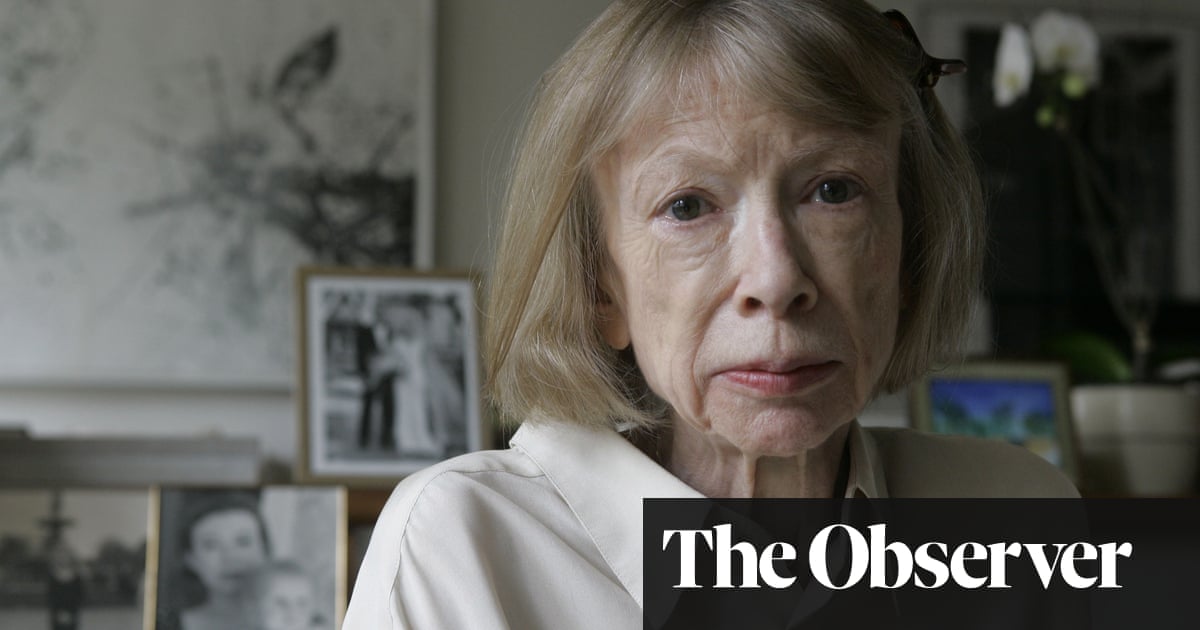O'clock on the evening of December 30, 2003, my hus-THE YEAR OF MAGICAL THINKING 7 band, John Gregory Dunne, appeared to (or did) experi ence, at the table where he and I had just sat down to dinner in the living room of our apartment in New York, a sudden massive coronary event that caused his death. ― Joan Didion, quote from The Year of Magical Thinking “Grief turns out to be a place none of us know until we reach it. We anticipate (we know) that someone close to us could die, but we do not look beyond the few days or weeks that immediately follow such an imagined death. We misconstrue the nature of even those few days or weeks. The Year of Magical Thinking About Reviews Quotes Excerpt From one of America’s iconic writers, a stunning book of electric honesty and passion. Joan Didion explores an intensely personal yet universal experience: a portrait of a marriage-and a life, in good times and bad-that will speak to anyone who has ever loved a husband or wife or child.
Overview
Understand magical thinking, and you will understand why the 20th century age of reason has lead us to a 'post-truth' society. Convert spb file to csv download free for windows 10.

We are taught to deny, demonise or even glamorise magic – rather than ever admit to thinking magically. But it is every bit as fundamental to human nature as science, religion or art.
Faced with the growing popularity of alternative healing, astrology and the New Age, people ask: “whatever happened to the Enlightenment?” They assume that 'The Enlightenment' marked a break with a superstitious past; it was a forward leap for humanity after which any return to magical thinking would be regressive, or even impossible. It was a forward step, but it began by looking back two millennia to the Classical era, and re-discovering the foundations on which to build a culture of science and humanism that is considered to be the high point in human achievement.
The classical era was itself a high point in human culture, but it only spanned five centuries. The following, Roman, era saw a resurgence of magical thinking and laid the foundations for alchemy, astrology, alternative healing, and much of today’s magical ideas and practices. Pontius Pilate famously asked “what is truth?” and two thousand years later postmodernist philosophers are raising similar questions.
1password family account. Is the revival of magical thinking just a natural evolution of thought, to be expected after five centuries of rationalism?
The author was brought up in the materialist 1950s and educated in that sceptical Enlightenment tradition to become a Cambridge mathematics graduate. Despite that, he became increasingly interested in magic and the occult and is now recognised as an authority on the subject. So how is it possible to shift from our knowledge of scientific reality to an acceptance of magic? The book describes the author’s own subjective experience of how that evolved over his lifetime.

Parts One and Two outline some of the important influences on his thinking and Parts Three and Four expand on CP Snow’s idea of two cultures (Art and Science) to propose four cultures: Art, Science, Religion and Magic. Part Five looks at the conflicts and misunderstandings between cultures and reasons why magic gets a raw deal, or is simply denied as a culture.
Part Six summarises the case and the Part Seven looks at contemporary trends and assumptions to show that the rise in magical thinking goes far deeper than just the visible popularity of astrology columns and alternative healing. A penultimate chapter provides practical suggestions for those willing to explore the value of magical thinking - or simply wanting to survive in a post-truth world.


Chapter 1
Magical Thinking Joan Didion
1
Life changes fast.
Life changes in the instant.
You sit down to dinner and life as you know it ends.
The question of self-pity.
Those were the first words I wrote after it happened. The computer dating on the Microsoft Word file ('Notes on change.doc') reads 'May 20, 2004, 11:11 p.m.,' but that would have been a case of my opening the file and reflexively pressing save when I closed it. I had made no changes to that file in May. I had made no changes to that file since I wrote the words, in January 2004, a day or two or three after the fact.
For a long time I wrote nothing else.
Life changes in the instant.
The ordinary instant.
At some point, in the interest of remembering what seemed most striking about what had happened, I considered adding those words, 'the ordinary instant.' I saw immediately that there would be no need to add the word 'ordinary,' because there would be no forgetting it: the word never left my mind. It was in fact the ordinary nature of everything preceding the event that prevented me from truly believing it had happened, absorbing it, incorporating it, getting past it. I recognize now that there was nothing unusual in this: confronted with sudden disaster we all focus on how unremarkable the circumstances were in which the unthinkable occurred, the clear blue sky from which the plane fell, the routine errand that ended on the shoulder with the car in flames, the swings where the children were playing as usual when the rattlesnake struck from the ivy. 'He was on his way home from work—happy, successful, healthy—and then, gone,' I read in the account of a psychiatric nurse whose husband was killed in a highway accident. In 1966 I happened to interview many people who had been living in Honolulu on the morning of December 7, 1941; without exception, these people began their accounts of Pearl Harbor by telling me what an 'ordinary Sunday morning' it had been. 'It was just an ordinary beautiful September day,' people still say when asked to describe the morning in New York when American Airlines 11 and United Airlines 175 got flown into the World Trade towers. Even the report of the 9/11 Commission opened on this insistently premonitory and yet still dumbstruck narrative note: 'Tuesday, September 11, 2001, dawned temperate and nearly cloudless in the eastern United States.'
'And then—gone.' In the midst of life we are in death, Episcopalians say at the graveside. Later I realized that I must have repeated the details of what happened to everyone who came to the house in those first weeks, all those friends and relatives who brought food and made drinks and laid out plates on the dining room table for however many people were around at lunch or dinner time, all those who picked up the plates and froze the leftovers and ran the dishwasher and filled our (I could not yet think my) otherwise empty house even after I had gone into the bedroom (our bedroom, the one in which there still lay on a sofa a faded terrycloth XL robe bought in the 1970s at Richard Carroll in Beverly Hills) and shut the door. Those moments when I was abruptly overtaken by exhaustion are what I remember most clearly about the first days and weeks. I have no memory of telling anyone the details, but I must have done so, because everyone seemed to know them. At one point I considered the possibility that they had picked up the details of the story from one another, but immediately rejected it: the story they had was in each instance too accurate to have been passed from hand to hand. It had come from me.
Another reason I knew that the story had come from me was that no version I heard included the details I could not yet face, for example the blood on the living room floor that stayed there until José came in the next morning and cleaned it up.
Joan Didion My Year Of Magical Thinking
Excerpted from The Year of Magical Thinking by Joan Didion Copyright © 2005 by Joan Didion. Excerpted by permission of Knopf, a division of Random House, Inc. All rights reserved. No part of this excerpt may be reproduced or reprinted without permission in writing from the publisher.
